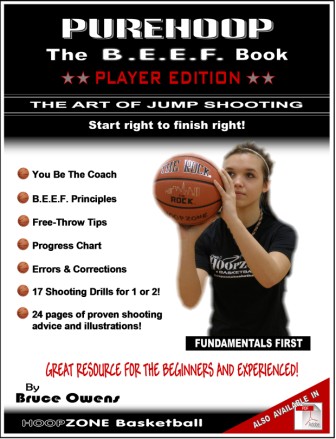“I can do all things through Christ who strengthens me.” - Philippians 4:13
Personal Motivational Quotes
Ten Commandments of Basketball Parents
WINNERS versus LOSERS
Your Success Is a Direct Result of Your Self-Motivation
Quotes and Matching Verses from the Bible
History of Basketball
Coach O thoughts
Personal Motivational Quotes
"Teamwork: The fuel that produces uncommon results in common people."
- Anonymous
"Basketball is a game that gives you every chance to be great, and puts every pressure on you to prove that you haven't got what it takes. It never takes away the chance, and it never eases up on the pressure."
- Coach Bob Sundvold
"When you have the attitude of a champion, you see adversity as your training partner."
- Conor Gillen
"In life you are given two ends, one to think with the other to sit on. Your success in life depends on which end you use the most. Heads you win, tails you lose."
- Conrad Burns
"Remember this, the choices you make in life, make you"
- John Wooden
"What to do with a mistake--recognize it, admit it, learn from it, forget it."
- Dean Smith
"There are two pains in life, the pain of discipline, and the pain of regret. Take your choice"
- Unknown
"If you think small things don't matter, think of the last game you lost by one point."
- Unknown
"Be more concerned with your character than your reputation."
- John Wooden
“Coming together is a beginning; keeping together is progress; working together is success.”
- Henry Ford
"A Loser says, "Well at least I tried!" When in reality, at most he tried; A Winner doesn't have to say it, he just does it...be a doer, not a tryer.."
- Randy E. Johnson
"Always keep an open mind and a compassionate heart."
- Phil Jackson
"Attitudes are contagious...Is yours worth catching?"
- Unknown
"What you are as a person is far more important that what you are as a basketball player"
- John Wooden
"Winning is about having the whole team on the same page"
- Bill Walton
"It doesn't matter who scores the points, it's who can get the ball to the scorer"
- Larry Bird
"Nothing will work unless you do."
- John Wooden
A Spelling Lesson: "Unity begins with you."
- Armilando Evora
"90% of the game is played above the shoulders."
- Jim Geddes
"If you pay attention to the grandstands...it won't be long before you join them."
- Anonymous
"You don't demand respect, you earn it."
- Steve Seidler
"Great teamwork is the only way we create the breakthroughs that define our careers."
- Pat Riley
"Players are made in the off season, teams are made during the season."
- Unknown
"We cannot direct the wind, but we can adjust the sail."
- author unknown
"The measure of who we are is what we do with what we have."
- Vince Lombardi
"Coaches build teams, parents build players."
- Charles Smyth
"The best teams have chemistry. They communicate with each other and they sacrifice personal glory for the common goal."
- Dave DeBusschere
"Victory or defeat is not determined at the moment of crisis, but rather in the long and unspectacular period of preparation."
- from an old textbook
"Be strong in body, clean in mind, lofty in ideals."
- Dr. James Naismith, the father of basketball
"The difference between an extraordinary player and an ordinary player is that little extra."
- Michael Burks
"It is not how big you are, it is how big you play."
- Unknown
return to top
Ten Commandments of Basketball Parents
1. Be positive with your daughter. Let her know she is accomplishing something simply by being a part of the team. Don’t put her down.
2. Don’t offer excuses for her if she is not playing. Encourage her to work and do her best.
3. Don’t put her coaches down. Remember, the coach represents the “boss”, the “authority”, the “parent”, the “teacher” and the “law”. If you are bad mouthing your daughter’s coaches constantly, how can you expect the youngster to play for them?
4. Encourage your daughter to follow the rules. Whether she is a first stringer or a seventh stringer, players must follow rules. Basketball is a very demanding sport and coaches must concern themselves with a players’ off-the- court activities in order to get maximum physical and mental performance out of the players.
5. Insist on good grades. If she doesn’t have passing grades, she doesn’t play.
6. Don’t try to live vicariously through your daughter. Basketball is a kid’s game: let her play it. Don’t show animosity or jealousy to any of your daughter’s teammates. This type of envy can rub off on your daughter and devastate the team. Who cares who scores as long as everyone does her job to the fullest?
7. Don’t be a know it all. The coaches’ work with the players 9 months a year and they know what each kid can do and what she cannot do. As a fan you are entitled to scream your head off, but please don’t become belligerent and arrogant toward the players. They are amateurs. Coaches know their talent. Respect that knowledge.
8. Insist on your daughter’s respect for team rules, school rules, game officials, and sportsmanship. Don’t let her make fools of her family, school, and team by some “uncalled-for” gesture. Self-respect begins with self-control.
9. Encourage your daughter to improve her self-image by believing in herself. Every person has been created with worth and value. Always remind your daughter of this fact. Tell her that she is special and that she is only limited to the degree that she limits herself. Don’t compare or contrast your daughter with family members who played previously. Every youngster is different.
10. Encourage your daughter to play for the love of the game – not for a scholarship or something that is in the hands of college recruiter. Insist on unselfishness. Usually good things happen to unselfish and hard-working people.
return to top
The Winner |
The Loser |
|
|
-Is always part of the answer. |
-Is always part of the problem. |
|
|
-Always has a program. |
-Always has an excuse. |
|
|
-Says, “Let me do it for you.” |
-Says, “That’s not my job.” |
|
|
-Sees an answer for every problem. |
-Sees a problem for every answer. |
|
|
-Sees a green near every sand trap. |
-Sees two or three sand traps near every green. |
|
|
-Says, “it may be difficult, but it’s possible” |
-Says, “it may be possible, but it’s too difficult” |
BE A WINNER
Your Success Is a Direct Result of Your Self-Motivation
DESIRE
Have a Goal
- Decide exactly what you want to accomplish, NOT what you don’t want.
- Write your goals down.
- Establish a timetable for yourself for this desire.
- Mentally visualize yourself achieving your goals. “See yourself making the key defensive play, pass, shot, etc. See yourself reaching your desires.”
FAITH
Have firm belief in your ability to execute your goals.
- All things are possible, if you believe in yourself.
- You can create anything you can imagine.
- “If you believe you will or if you believe you won’t you’re probably right!”
- Thinking you will fail today because you failed yesterday is wrong.
- You can control your own destiny, as a team and as an individual.
- You are not inferior
- You are not superior.
- You are you.
PLANNING
Learn to concentrate.
- All things are possible, if you believe in yourself.
- If you concentrate during practice, you will concentrate during a game.
- You play the way you practice, therefore you should practice they way you want to play.
- Set a definite time during the day to concentrate.
- Succeed in little things daily to build an atmosphere of success.
DECISION MAKING
- Successful people make decisions quickly and change them slowly.
- Quick decisions are a result of initiative, knowledge and experience.
- Having goals is NOT ENOUGH. Have the courage to ACT!
- Mistakes are human. None of us will shoot 100%, but if we don’t try, we will shoot 0%.
WILL POWER
- Know what you want.
- Work to achieve the goal.
- DO NOT GIVE UP on your goals no matter what the odds.
- Will power is persistence
- Will power is a state of mind.
- Will power means developing a WINNING ATTITUDE.
UTILIZATION OF THE SUBCONSCIOUS MIND
- Your conscious mind collects information.
- Your subconscious performs.
- Feed it positive thoughts and you will perform positively.
- The mental picture from the computer will take over your physical reactions.
- You can relax and let it happen.
REMEMBER
- Get the picture of what you want.
- Never forget your picture
- Believe you will live that picture
- Keep telling yourself you will succeed
- WORK to succeed.
return to top
Quotes and Matching Versus from the Bible
When God measure a man, He puts the tape around the heart instead of the head. – 1 Samuel 16:7
The grass may look greener on the other side, but it still has to be mowed. – Hebrews 13:5
A person’s true character is reveled by what he does when no one is watching. – Ephesians 6:6 (NIV)
The cure of crime is not in the electric chair, but in the high chair. – Proverbs 22:6
If you don’t stand for something, you will fall for anything. – Isaiah 7:9 (NIV)
You should never let adversity get you down, except on your knees. – James 5:13 (NIV)
It is good to remember that the teakettle, although up to its neck in hot water, continues to sing. – 1 Thessalonians 5:16, 18
It’s good to be a Christian and know it, but it’s better to be a Christian and show it! – John 13:35
Sorrow looks back. Worry looks around. Faith looks up. – Hebrews 12:2 (NASB)
Sometimes we are so busy adding up our troubles that we forget to count our blessings. – Psalm 77:11, 12
Our days are identical suitcases; all the same size, but some people can pack more into them than others. – Ephesians 5:15, 16 (NIV)
return to top
History of Basketball
 In early December 1891, Dr. James Naismith, a Canadian physician from McGill University and minister on the faculty of a college for YMCA professionals (today, Springfield College) in Springfield, Massachusetts, USA, sought a vigorous indoor game to keep his students occupied and at proper levels of fitness during the long New England winters. After rejecting other ideas as either too rough or poorly suited to walled-in gymnasiums, he wrote the basic rules and nailed a peach basket onto an 10-foot (3.05 m) elevated track. In contrast with modern basketball nets, this peach basket retained its bottom, so balls scored into the basket had to be poked out with a long dowel each time. A soccer ball was used to shoot goals. His handwritten diaries of the time indicate that he was nervous about this invention, which incorporated rules from a Canadian children’s game called “Duck on a Rock”, as many had failed before it. In early December 1891, Dr. James Naismith, a Canadian physician from McGill University and minister on the faculty of a college for YMCA professionals (today, Springfield College) in Springfield, Massachusetts, USA, sought a vigorous indoor game to keep his students occupied and at proper levels of fitness during the long New England winters. After rejecting other ideas as either too rough or poorly suited to walled-in gymnasiums, he wrote the basic rules and nailed a peach basket onto an 10-foot (3.05 m) elevated track. In contrast with modern basketball nets, this peach basket retained its bottom, so balls scored into the basket had to be poked out with a long dowel each time. A soccer ball was used to shoot goals. His handwritten diaries of the time indicate that he was nervous about this invention, which incorporated rules from a Canadian children’s game called “Duck on a Rock”, as many had failed before it.
Naismith’s new game is quite similar to the game of team handball, which had already been invented in the early 1890s.
The first official basketball game was played in the YMCA gymnasium on January 20, 1892 with nine players, on a court just half the size of a present-day National Basketball Association (NBA) court. “Basket ball”, the name suggested by one of Naismith’s students, was popular from the beginning.
Women’s basketball began in 1892 at Smith College when Senda Berenson, a physical education teacher, modified Naismith’s rules for women.
Basketball’s early adherents were dispatched to YMCAs throughout the United States, and it quickly spread through the USA and Canada. By 1895, it was well established at several women’s high schools. While the YMCA was responsible for initially developing and spreading the game, within a decade it discouraged the new sport, as rough play and rowdy crowds began to detract from the YMCA’s primary mission. However, other amateur sports clubs, colleges, and professional clubs quickly filled the void. In the years before World War I, the Amateur Athletic Union and the Intercollegiate Athletic Association (forerunner of the NCAA) vied for control over the rules for the game.
Basketball was originally played with a soccer ball. The first balls made specifically for basketball were brown, and it was only in the late 1950s that Tony Hinkle, searching for a ball that would be more visible to players and spectators alike, introduced the orange ball that is now in common use.
Dribbling, the bouncing of the ball up and down while moving, was not part of the original game except for the “bounce pass” to teammates. Passing the ball was the primary means of ball movement. Dribbling was eventually introduced but limited by the asymmetric shape of early balls. Dribbling only became a major part of the game around the 1950s as manufacturing improved the ball shape.
Basketball, netball, volleyball, and lacrosse are the only ball games which have been identified as being invented by North Americans. Other ball games, such as baseball and Canadian football, have Commonwealth of Nations, European, Asian or African connections.
The Original 13 Rules of Basketball As written by Dr. James Naismith
1. The ball may be thrown in any direction with one or both hands.
2. The ball may be batted in any direction with one or both hands (never with a fist).
3. A player cannot run with the ball. The player must throw it from the spot on which he catches it, allowance to made for a man who catches the ball when running if he tries to stop.
4. The ball must be held by the hands. The arms or body must not be used for holding it.
5. No shouldering, holding, pushing, tipping, or striking in any way the person of an opponent shall be allowed; the first infringement of this rule y any player shall count as a foul, the second shall disqualify him until the next goal is made, or if there was evident intent to injure the person, for the whole of the game, no substitute allowed.
6. A foul is striking at the ball with the fist, violation of Rules 3, 4 and such as described in Rule 5.
7. If either side makes three consecutive fouls it shall count as a goal for the opponents (consecutive means without the opponents in the mean time making a foul).
8. A goal shall be made when the ball is thrown or batted from the grounds into the base key and stays there, providing those defending the goal do not touch or disturb the goal. If the ball rests on the edges, and the opponent moves the basket, it shall count as a goal.
9. When the ball goes out of bounds, it shall be thrown into the field of play by the person first touching it. He has a right to hold it unmolested for five seconds. In case of a dispute, the umpire shall throw it straight into the field. The thrower-in is allowed five seconds; if he holds it longer it shall go to the opponent. If any side persists in delaying the game, the umpire shall call a foul on the side.
10. The umpire shall be the judge of the men and shall note the fouls and notify the referee when three consecutive fouls have been made. He shall have power to disqualify men according to Rule 5.
11. The referee shall be judge of the ball and shall decide when the ball is in play, in bounds, to which side it belongs, and shall keep the account of the goals, with any other duties that are usually performed by the referee.
12. The time shall be two fifteen minute halves, with five minutes’ rest between.
13. The side making the most goals in the in that time shall be declared the winner. In the case of a draw, the game my, by agreement of the captains, be continued until another goal is made.
return to top
Coach O Thoughts
 Not every athlete is crazy about basketball and that is OK! Many kids enjoy playing 3 sports giving equal time to each one. These athletes devote themselves to basketball, volleyball and softball/baseball or track. I commend these kids for being involved and staying active! But we live in a new time of sports. Gone are the days of trying to be very competitive in a sport without spending extra off season time to gain the advantage. Successful teams today are teams who have a few athletes, per grade, who have a passion for the sport of basketball playing additional seasons. These kids play out of their HS season on traveling basketball teams, they devote extra summer time in developing their game, and they take advantage of extra one on one coaching time. These kids are not the ones who just think of being great they are the ones who want it, parents support them, and are willing to spend the time and money to get it. Their passion is basketball and when summer comes the majority of their sporting time is basketball. After their HS basketball season they are still willing to spend time with a coach working on ball handling skills, shooting, etc. These are the athletes a coach can build a program around around. Not every athlete is crazy about basketball and that is OK! Many kids enjoy playing 3 sports giving equal time to each one. These athletes devote themselves to basketball, volleyball and softball/baseball or track. I commend these kids for being involved and staying active! But we live in a new time of sports. Gone are the days of trying to be very competitive in a sport without spending extra off season time to gain the advantage. Successful teams today are teams who have a few athletes, per grade, who have a passion for the sport of basketball playing additional seasons. These kids play out of their HS season on traveling basketball teams, they devote extra summer time in developing their game, and they take advantage of extra one on one coaching time. These kids are not the ones who just think of being great they are the ones who want it, parents support them, and are willing to spend the time and money to get it. Their passion is basketball and when summer comes the majority of their sporting time is basketball. After their HS basketball season they are still willing to spend time with a coach working on ball handling skills, shooting, etc. These are the athletes a coach can build a program around around.
What Does A Coach Look For?
Good qualities :
1. Respectful to teammates, coach and interacts well
2. Sprints hard, plays hard, pays attention at ALL times
3. Obvious by your actions basketball has a very high priority
4. Shows up to open gyms with very high attendance
5. Clean of drugs, alcohol, cigarettes, skipping school, fighting, etc.
6. Gets good grades and involved in school functions
7. You are a person of your word and I can trust what you tell me
Poor qualities :
1. Talks poorly of your teammates and coach
2. Would rather jog than push yourself
3. More interested in boys, sitting home and lack of drive to practice
4. Hardly ever shows up to open gyms, but talks like it
5. Likes to live on the edge, getting in trouble at times thinking no ones knows
6. Stays after school for poor grades and attendance
7. You tell me one thing then do another; I can’t trust what you say to me return to top |






